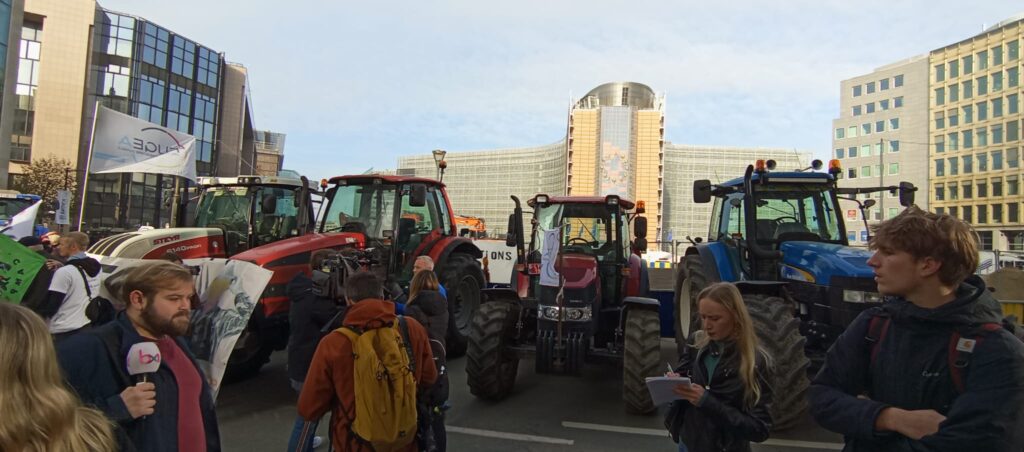Brussels – It is a problem for ‘made in Europe,’ for prices that are impossible to counter, and competition from supply chains that are already productive and able to meet the EU’s food needs. Then, there are different sustainability standards, with stringent rules for one side only. In short, the EU-Mercosur free trade agreement, on which there is no turning back for the European Commission, reignites the engines of tractors, which, little by little and quietly, return to the streets of the EU capital as a warning.
There are not many of them — a hundred or so — but you can still feel their presence. They are the farmers of the Via Campesina, worried about a free trade agreement between the 27 member states and the bloc of five (Argentina, Brazil, Paraguay, Uruguay, plus the suspended Venezuela) that could penalize — a lot — especially them, small European farmers.

There was no invasion of the city. Just four tractors parked in front of the headquarters of the European Commission, the EU institution responsible for a free trade negotiation with Mercosur that appears to be on the home stretch. “It could be signed on November 18,” says a concerned member of FUGEA, the Belgian union for young farmers for sustainable agriculture. “Today we are a few, but this is a symbolic demonstration, the beginning of a mobilization that will continue.”
A puppet hanging with a sign around his neck saying “murdered by European policies” and banners with slogans that sound like a rejection of the choices made in Brussels. “Stop EU-Mercosur,” “competition feeds big business, farmers feed people.” Parts of European politics picked up and embraced that last slogan. “The big winners for such an agreement are the big producers, while the losers are the small farmers,” Carola Rackete, independent MEP for la Sinistra, said. The EU-Mercosur agreement, she denounces, goes against “our vision of organic, local, sustainable, and small-producer-based agriculture.”
Not many trade associations took to the streets, yet they were backed and supported. “This agreement with Mercosur is the worst ever, one that destroys EU agriculture and contradicts the Green Deal,” said Manon Aubry, co-chair of The Left Group. “We should be importing meat for whose production we deforest and clear forests,” she stressed. Moreover, “we are talking about products made with pesticides, in some cases GMOs that are authorized there but prohibited here in our country.”
Then there is the issue of food sovereignty. Via Campesina and FUGEA point out that by sealing the trade agreement with Mercosur, the EU would start buying from abroad agri-food items that are already produced in Europe, such as poultry, honey, and soja, at prices that undermine ‘made in the EU’ produces. Efforts are being made to draw attention to an issue that is felt and on which there is concern.
“If they go ahead, the farmers’ anger will be felt, just like in the past few months,” chants one of the organizers from a make-shift stage, holding a megaphone and wearing a blue FUGEA jacket. Brussels risks again becoming the scene of tensions and clashes in the wake of an agreement with Mercosur that continues to displease the European agricultural world.
English version by the Translation Service of Withub![Trattori, proteste e critiche degli agricoltori per l'intenzione di chiudere l'accordo Ue-Mercosur [Bruxelles, 13 novembre 2024. Foto: Emanuele Bonini]](https://www.eunews.it/wp-content/uploads/2024/11/fugea241113-750x375.jpeg)





